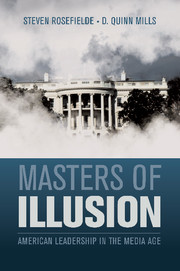Book contents
- Frontmatter
- Contents
- List of Tables and Figures
- Preface
- Acronyms
- Executive Summary
- Acknowledgments
- PART I NATIONAL SECURITY IN THE NEW AGE
- PART II AMERICAN PUBLIC CULTURE AND THE WORLD
- PART III AMERICAN PUBLIC CULTURE AND OURSELVES
- PART IV THE RECONFIGURATION OF NATIONAL WEALTH AND POWER
- PART V VORTEXES OF DANGER
- PART VI THE AMERICAN RESPONSE
- PART VII LEADING TOWARD PEACE
- PART VIII AMERICAN PRESIDENTIAL LEADERSHIP
- 18 How Public Culture Inhibits Presidential Leadership
- 19 Choosing a Great President
- 20 Master of Illusions
- Notes
- Glossary
- Bibliography
- Index
20 - Master of Illusions
Published online by Cambridge University Press: 31 July 2009
- Frontmatter
- Contents
- List of Tables and Figures
- Preface
- Acronyms
- Executive Summary
- Acknowledgments
- PART I NATIONAL SECURITY IN THE NEW AGE
- PART II AMERICAN PUBLIC CULTURE AND THE WORLD
- PART III AMERICAN PUBLIC CULTURE AND OURSELVES
- PART IV THE RECONFIGURATION OF NATIONAL WEALTH AND POWER
- PART V VORTEXES OF DANGER
- PART VI THE AMERICAN RESPONSE
- PART VII LEADING TOWARD PEACE
- PART VIII AMERICAN PRESIDENTIAL LEADERSHIP
- 18 How Public Culture Inhibits Presidential Leadership
- 19 Choosing a Great President
- 20 Master of Illusions
- Notes
- Glossary
- Bibliography
- Index
Summary
The heart of this book is the question: How can our leaders deal with an electorate whose heads are full of illusions?
Our public culture is a major contributor to making the United States unpredictable and consequently an agent of instability in the world. This is because an American president ordinarily fears the political consequences of being candid with the American people about our objectives when what he tells them is in conflict with deeply held illusions.
How much truth can the American people take? Our public culture is driven by wishful thinking by the public and results in illusions which our politicians and media embrace in order to curry our favor. There would appear to be no prospect within this dynamic for a more candid presidency.
Our conclusion about the reality of the United Nations and what it means for American policy is precisely the sort of hard truth that our country begs from our president but that so contradicts the illusions of our public culture that it is very difficult for the president to respond honestly. Do we really want to know about the reality of the UN and can we accept it?
The difficult issues arise when the answer is no – when we cling tenaciously, as we often do, to the illusions of our public culture. In that case, what should the president do?
- Type
- Chapter
- Information
- Masters of IllusionAmerican Leadership in the Media Age, pp. 446 - 472Publisher: Cambridge University PressPrint publication year: 2006

